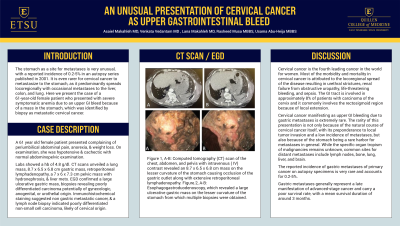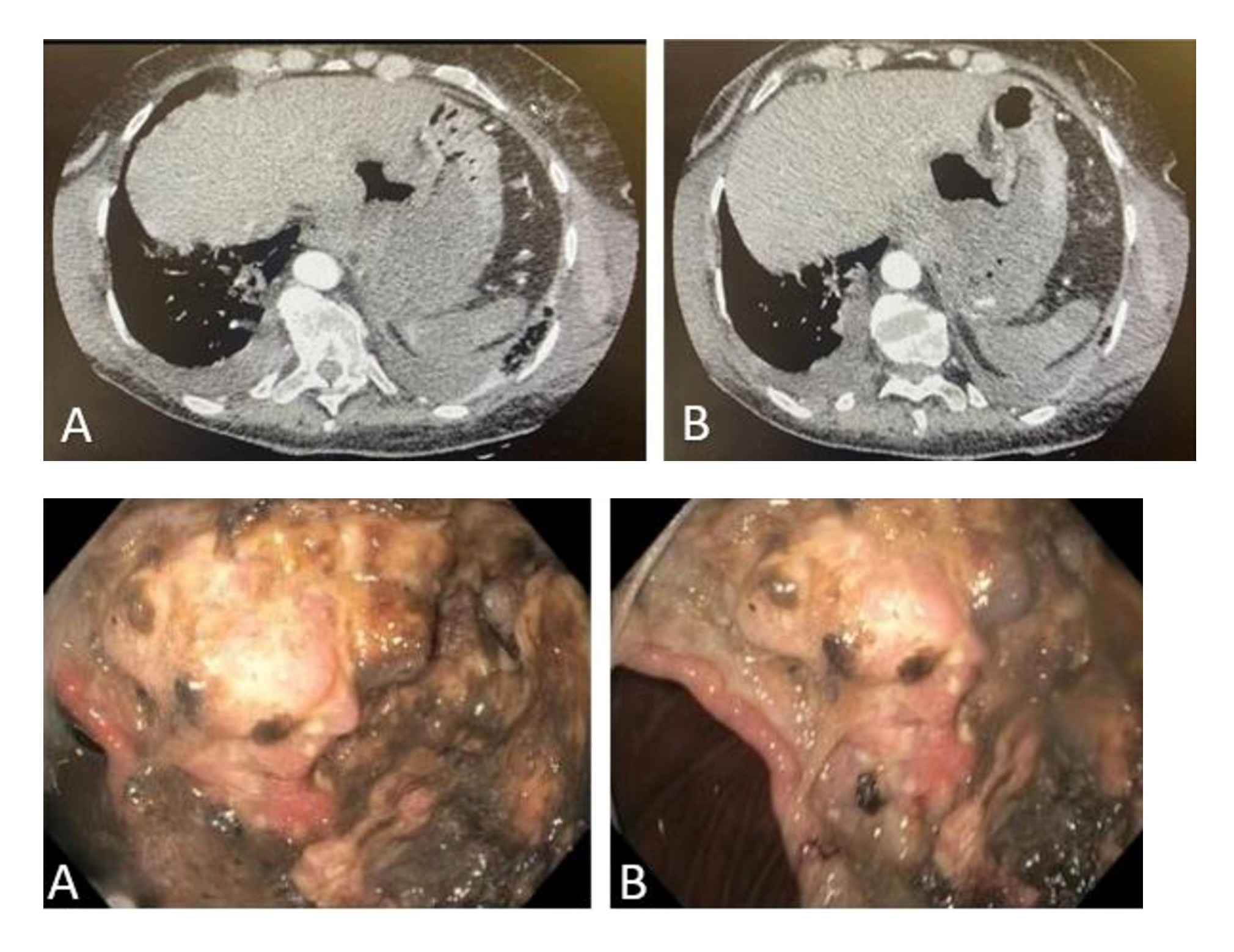Tuesday Poster Session
Category: GI Bleeding
P4253 - An Unusual Presentation Of Cervical Cancer As Upper Gastrointestinal Bleeding
Tuesday, October 29, 2024
10:30 AM - 4:00 PM ET
Location: Exhibit Hall E

Has Audio
.jpeg.jpg)
Asaiel Makahleh, MD
East Tennessee State University
Johnson City, TN
Presenting Author(s)
Asaiel Makahleh, MD, Venkata Vedantam, MD, Rasheed Musa, MBBS, Lana Makahleh, MD, Usama Abu-Heja, MBBS
East Tennessee State University, Johnson City, TN
Introduction: The stomach as a site for metastases is very unusual, with a reported incidence of 0.2-5% in an autopsy series published in 2001. It is even rarer for cervical cancer to metastasize to the stomach, as it predominantly spreads locoregionally with occasional metastases to the liver, colon, and lung. Here we present the case of a 61-year-old female patient who presented with severe symptomatic anemia due to an upper GI bleed because of a mass in the stomach, which was identified by biopsy as metastatic cervical cancer.
Case Description/Methods: A 61 year old female patient presented complaining of periumbilical abdominal pain, anorexia, & weight loss. On examination, she was hypotensive & cachectic with normal abdominopelvic examination.
Labs showed a hb of 4.8 g/dl. CT scans unveiled a lung mass, 8.7 x 6.5 x 6.8 cm gastric mass, retroperitoneal lymphadenopathy, a 7 x 6 x 7.3 cm pelvic mass with hydronephrosis, & liver mets. EGD confirmed a large ulcerative gastric mass, biopsies revealing poorly differentiated carcinoma potentially of gynecologic, anogenital, or urothelial origin. Immunohistochemical staining suggested non gastric metastatic cancer, & a lymph node biopsy indicated poorly differentiated non-small cell carcinoma, likely of cervical origin.
Discussion: Cervical cancer is the fourth leading cancer in the world for women. Most of the morbidity and mortality in cervical cancer is attributed to the locoregional spread of the disease resulting in urethral strictures, renal failure from obstructive uropathy, life-threatening bleeding, and sepsis. The GI tract is involved in approximately 8% of patients with carcinoma of the cervix and it commonly involves the rectosigmoid region because of local extension.
Cervical cancer manifesting as upper GI bleeding due to gastric metastases is extremely rare. The rarity of this presentation is not only because of the natural course of cervical cancer itself, with its preponderance to local tumor invasion and a low incidence of metastases, but also because of the stomach being a rare harbor for metastases in general. While the specific organ tropism of malignancies remains unknown, common sites for distant metastases include lymph nodes, bone, lung, liver, and brain.
The reported incidence of gastric metastases of primary cancer on autopsy specimens is very rare and accounts for 0.2-5%.
Gastric metastases generally represent a late manifestation of advanced-stage cancer and carry a poor survival rate, with a mean survival duration of around 3 months.

Disclosures:
Asaiel Makahleh, MD, Venkata Vedantam, MD, Rasheed Musa, MBBS, Lana Makahleh, MD, Usama Abu-Heja, MBBS. P4253 - An Unusual Presentation Of Cervical Cancer As Upper Gastrointestinal Bleeding, ACG 2024 Annual Scientific Meeting Abstracts. Philadelphia, PA: American College of Gastroenterology.
East Tennessee State University, Johnson City, TN
Introduction: The stomach as a site for metastases is very unusual, with a reported incidence of 0.2-5% in an autopsy series published in 2001. It is even rarer for cervical cancer to metastasize to the stomach, as it predominantly spreads locoregionally with occasional metastases to the liver, colon, and lung. Here we present the case of a 61-year-old female patient who presented with severe symptomatic anemia due to an upper GI bleed because of a mass in the stomach, which was identified by biopsy as metastatic cervical cancer.
Case Description/Methods: A 61 year old female patient presented complaining of periumbilical abdominal pain, anorexia, & weight loss. On examination, she was hypotensive & cachectic with normal abdominopelvic examination.
Labs showed a hb of 4.8 g/dl. CT scans unveiled a lung mass, 8.7 x 6.5 x 6.8 cm gastric mass, retroperitoneal lymphadenopathy, a 7 x 6 x 7.3 cm pelvic mass with hydronephrosis, & liver mets. EGD confirmed a large ulcerative gastric mass, biopsies revealing poorly differentiated carcinoma potentially of gynecologic, anogenital, or urothelial origin. Immunohistochemical staining suggested non gastric metastatic cancer, & a lymph node biopsy indicated poorly differentiated non-small cell carcinoma, likely of cervical origin.
Discussion: Cervical cancer is the fourth leading cancer in the world for women. Most of the morbidity and mortality in cervical cancer is attributed to the locoregional spread of the disease resulting in urethral strictures, renal failure from obstructive uropathy, life-threatening bleeding, and sepsis. The GI tract is involved in approximately 8% of patients with carcinoma of the cervix and it commonly involves the rectosigmoid region because of local extension.
Cervical cancer manifesting as upper GI bleeding due to gastric metastases is extremely rare. The rarity of this presentation is not only because of the natural course of cervical cancer itself, with its preponderance to local tumor invasion and a low incidence of metastases, but also because of the stomach being a rare harbor for metastases in general. While the specific organ tropism of malignancies remains unknown, common sites for distant metastases include lymph nodes, bone, lung, liver, and brain.
The reported incidence of gastric metastases of primary cancer on autopsy specimens is very rare and accounts for 0.2-5%.
Gastric metastases generally represent a late manifestation of advanced-stage cancer and carry a poor survival rate, with a mean survival duration of around 3 months.

Figure: Figure 1, A-B: Computed tomography (CT) scan of the chest, abdomen, and pelvis with
intravenous ( IV) contrast revealed an 8.7 x 6.5 x 6.8 cm mass on the lesser curvature of the
stomach causing occlusion of the gastric outlet along with extensive retroperitoneal
lymphadenopathy.
Figure.2, A-B: Esophagogastroduodenoscopy, which revealed a large ulcerative gastric mass on
the lesser curvature of the stomach from which multiple biopsies were obtained.
intravenous ( IV) contrast revealed an 8.7 x 6.5 x 6.8 cm mass on the lesser curvature of the
stomach causing occlusion of the gastric outlet along with extensive retroperitoneal
lymphadenopathy.
Figure.2, A-B: Esophagogastroduodenoscopy, which revealed a large ulcerative gastric mass on
the lesser curvature of the stomach from which multiple biopsies were obtained.
Disclosures:
Asaiel Makahleh indicated no relevant financial relationships.
Venkata Vedantam indicated no relevant financial relationships.
Rasheed Musa indicated no relevant financial relationships.
Lana Makahleh indicated no relevant financial relationships.
Usama Abu-Heja indicated no relevant financial relationships.
Asaiel Makahleh, MD, Venkata Vedantam, MD, Rasheed Musa, MBBS, Lana Makahleh, MD, Usama Abu-Heja, MBBS. P4253 - An Unusual Presentation Of Cervical Cancer As Upper Gastrointestinal Bleeding, ACG 2024 Annual Scientific Meeting Abstracts. Philadelphia, PA: American College of Gastroenterology.
